Healthcare Disruptors
The Healthcare Disruptors podcast celebrates those who dare to reshape the medical landscape through innovation, bold ideas, and transformative solutions to improve patient care and physician wellbeing. This show is hosted by Ohad Arazi, CEO of Clarius Mobile Health. For more information about Clarius, visit www.Clarius.com
Episodes
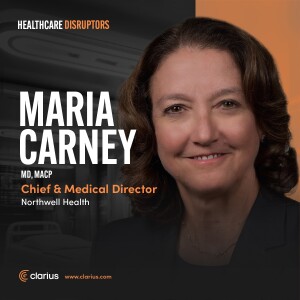
Thursday Jul 25, 2024
Thursday Jul 25, 2024
In this episode, Ohad Arazi speaks to Maria Carney, MD, MACP, Chief and Medical Director at Northwell Health, who brings her extensive experience and passion for geriatric and palliative care to the forefront. Dr. Carney dives into her inspiring journey, sharing what motivated her to focus on elder care, including balancing longevity with quality of life and advocating for a patient-centered approach.
Dr. Carney explains how tech innovations can enhance communication between healthcare teams and patients, streamline workflows, and support robust home care networks. She also highlights the critical need for supporting caregivers, offering practical advice for healthcare providers on how to better equip and empower those who care for our aging population.
Topics discussed:
How tech innovations can improve communication, streamline workflows, and support home care networks for older adults.
Practical advice on how healthcare providers can better equip and empower caregivers of the aging population.
Advocating for a patient-centered approach in palliative care to enhance quality of life.
The unique challenges faced in caring for older adults and strategies to overcome them.
Various models like primary care, PACE programs, and hospice house calls that improve outcomes for older adults.
Supporting the growing elderly population and its implications on healthcare systems.
Encouraging healthcare providers to focus on what matters most to patients and utilize technology effectively.
The need for early discussions and planning for future healthcare needs.
Resources Mentioned:
Maria Carney’s book, The Aging Revolution
Maria Carney on X
Maria Carney on LinkedIn
Co-author of the book The Aging Revolution – purchase here
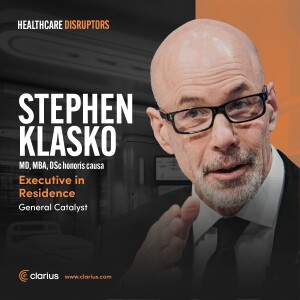
Thursday Jul 11, 2024
Thursday Jul 11, 2024
In this episode of Healthcare Disruptors, Ohad Arazi speaks to Dr. Stephen Klasko, MD, MBA, DSc honoris causa, Executive in Residence at General Catalyst, to explore innovative intersections between academic medicine and digital health. Dr. Klasko dives into the concept of “unscaling” healthcare, emphasizing the need to anticipate future needs today for a more patient-centric system.
Dr. Klasko also shares insights on bridging the gap between tech entrepreneurs and frontline healthcare providers to create sustainable solutions. Additionally, he discusses the importance of disruption and creation in transforming the healthcare landscape.
Topics discussed:
The concept of "unscaling" and its importance in creating patient-centric healthcare systems that anticipate future needs.
The blend of traditional academic approaches with innovative digital solutions to improve healthcare efficiency and patient care.
How tech entrepreneurs can better understand and address frontline healthcare challenges for sustainable solutions.
The role of disruptive innovation in transforming the healthcare landscape and creating new opportunities for improvement.
General Catalyst’s whole-health assurance thesis and its implications for the future of healthcare.
The need for healthcare solutions to be scalable and sustainable to effectively address broader healthcare challenges.
The importance of viewing healthcare innovations from the eyes of the patient for comprehensive care.
The intersection of academic medicine and technology in fostering healthcare advancements and innovation.
Predictions on what will be obvious in healthcare ten years from now and the steps needed to achieve those advancements today.
Resources Mentioned:
Dr. Klasko’s website.
Dr. Klasko’s email: sklasko@generalcatalyst.com
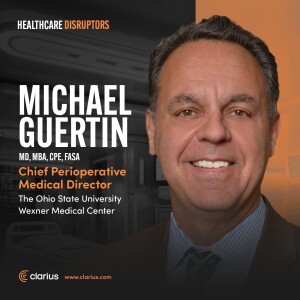
Thursday Apr 18, 2024
Thursday Apr 18, 2024
In this episode of the Healthcare Disruptors podcast, Ohad speaks with Michael Guertin, MD MBA CPE FASA, Chief Perioperative Medical Director at The Ohio State University Wexner Medical Center about his career journey and the important lessons about leadership and communication he’s learned along the way.
They explore the synthesis of clinical expertise with entrepreneurial endeavors and the importance of leadership in driving efficiency and quality patient care. Michael also reflects on the evolution of healthcare leadership, emphasizing the integration of innovation and technology in shaping the future of the industry.
Topics discussed:
How Michael was drawn to the healthcare field because of the challenge.
How Michael has shaped his leadership skills throughout his various roles.
How communication and how someone presents themselves is just as important as clinical skills.
The integration of innovative ideas with collaboration and communication among stakeholders to address challenges in healthcare.
How it's important to create a good business case for technologies such as point of care ultrasound and robotics.
How healthcare should synthesize the clinical side and the administrative side for better organization and better patient care.
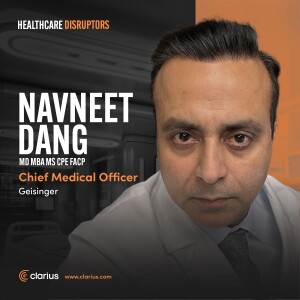
Thursday Apr 04, 2024
Thursday Apr 04, 2024
In this episode of the Healthcare Disruptors podcast, Ohad speaks with Navneet Dang, MD MBA MS CPE FACP, Chief Medical Officer at Geisinger, about his journey to hospital management and what he likes best about it: being able to touch millions of patient lives.
They also discuss how the US healthcare system measures outcomes as well as how technology and other innovations to the healthcare landscape are improving these outcomes.
Topics discussed:
Navneet's professional journey and decision to transition from clinical practice to hospital management.
How the scope of affecting patient lives expands exponentially as a hospital manager.
How the US healthcare system measures patient outcomes and whether they're measuring the right ones.
The pivotal role technology plays in achieving better patient experiences and outcomes.
How improvements on existing technologies such as handheld ultrasounds have shaped patient care in clinic and at home.
Focusing on improving accessibility to preventative care such as with physicians so that hospital outcomes are even better.
How innovative programs such as hospital-at-home services are shaping the landscape of patient care.
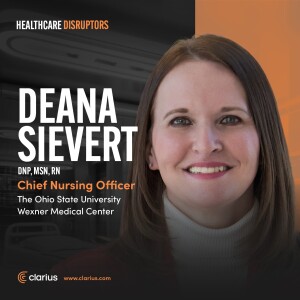
Thursday Mar 21, 2024
Thursday Mar 21, 2024
In this episode of the Healthcare Disruptors podcast, Ohad speaks with Deana Sievert, DNP, MSN, RN, Chief Nursing Officer at The Ohio State University Wexner Medical Center, about her journey to nursing leadership, the challenges the field has faced, how technology has shaped nursing, and how new nurses are being trained in innovative ways.
Topics discussed:
Staffing issues at an all time high and some potential solutions to attract new recruits.
How tech innovators and clinicians need to listen to each other to achieve greater progress.
How technology such as VR and AI have already changed the nursing landscape, and what might be next.
How new nurses are being trained in innovative ways.
Balancing controlling costs with providing high-quality care and improving patient outcomes.
Reimagining what care looks like with services such as hospital-at-home.
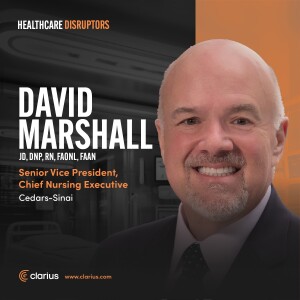
Thursday Mar 07, 2024
Thursday Mar 07, 2024
In this episode of the Healthcare Disruptors podcast, Ohad Arazi speaks to David Marshall, JD, DNP, RN, FAONL, FAAN, Senior Vice President and Chief Nursing Executive at Cedars-Sinai. During the episode, they share insights into how Cedars-Sinai is leading the way in integrating innovative technologies to improve patient care and enhance the work environment for nurses.
Topics discussed:
The evolution of nursing over the past 40 years and the constant need for innovation in healthcare.
The impact of technology on the nurse-patient relationship and how it can both enhance and detract from patient care.
Cedars-Sinai's role as an accelerator for healthcare startups, fostering innovation to improve patient outcomes.
The importance of balancing technology with the human aspect of healthcare to strengthen human-to-human connections.
Advances in imaging technology, such as point-of-care ultrasound, and its significant impact on nursing practices and patient care.
Strategies to address the healthcare capacity challenges, including improving flow and throughput in hospitals.
The critical role of professional development and investment in nursing staff as a cornerstone of resilient healthcare systems.
Advice for technologists and the tech community on ensuring nursing needs and perspectives are integral to healthcare solutions.
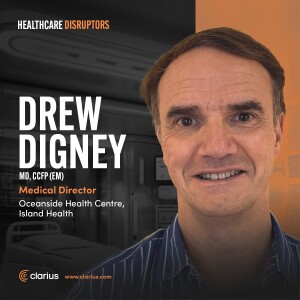
Thursday Feb 22, 2024
Thursday Feb 22, 2024
In this episode of the Healthcare Disruptors podcast, Ohad speaks with Drew Digney, MD, CCFP (EM), Medical Director at Oceanside Health Centre, Island Health - Vancouver Island Health Authority. They discuss the biggest challenges facing healthcare today — demographics, access, and accountability — and what hospital administrators can do to reduce wait times and improve patient care, including better data recording and tracking. They also talk about how handheld ultrasound assists in faster decision-making and how AI will be a "game-changer" for radiology.
Topics discussed:
How primary care has changed with the rise in specialists and fewer generalists.
How reducing wait times improved care across "vertical" customers and "horizontal" patients.
Why an aging demographic of patients presents a challenge to healthcare systems.
Why hospitals need smoothing when it comes to access on different days of the week.
How a lack of accountability has led to healthcare having an expenditure problem.
Why recording and tracking good data is a solution to more accountability and less variability.
How handheld ultrasound improves decision-making and how AI in radiology will be a "game-changer."
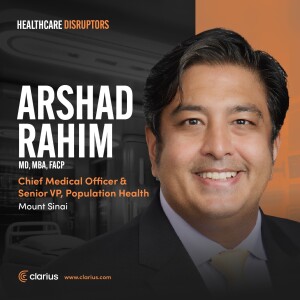
Thursday Feb 08, 2024
Thursday Feb 08, 2024
In this episode of the Healthcare Disruptors podcast, Ohad speaks with Arshad Rahim, MD, MBA, FACP, Chief Medical Officer & Senior VP, Population Health at Mount Sinai. They discuss the intersection of medicine and business, and why populations need to "get a lot more health for the amount of healthcare we deliver." They also talk about the benefits of handheld ultrasound, the role technology plays in workforce optimization, and advice for healthcare leaders looking to leverage innovation.
Topics discussed:
How Arshad developed a career that merges medicine and business into initiatives that "start and end with the patient."
Why the honeymoon of healthcare disruption is over and how to focus on more value-based care going forward.
How handheld ultrasound can be a benefit for hospitalists.
The role technology plays in the solution to better healthcare, especially in workforce optimization.
The challenges of a specialist-saturated healthcare system and how to incentivize more primary care.
The importance of getting more patients engaged in aspects of their health and how to support those initiatives.
Advice to healthcare leaders who are focused on leveraging innovation to improve population health.
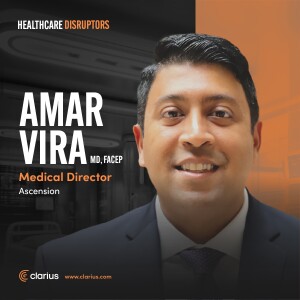
Wednesday Jan 24, 2024
Wednesday Jan 24, 2024
In the first episode of the Healthcare Disruptors podcast, Ohad speaks with Amar Vira, MD, FACEP, Director of Ultrasound Education, Emergency Medicine Residency Program, at Dell Medical School at the University of Texas at Austin, and Medical Director at Ascension. They discuss how Amar was drawn to the different skillsets and facets of emergency medicine, and how he sees ultrasound as a way to improve the patient experience with quick diagnosis — not "just another step." They also talk about how ultrasound learning hurdles are lowering with its introduction in med school, how medical technology needs to serve multiple purposes, and why healthcare needs to add value, not drive up costs.
Topics discussed:
How Amar got into emergency medicine, how he's shaping the future of healthcare through education, and how he's expanded into the administrative space.
Why ultrasound shouldn't be seen as "just another step" but as a way to improve the patient experience.
How the barriers to learning ultrasound are decreasing with its introduction in med school.
How healthcare is challenged by increasing costs and why new technologies have to serve multiple purposes to justify usage.
How AI has the potential to make workflows more efficient.
When it comes to billing, how healthcare professionals should think about adding value, not driving up costs.
What healthcare can do to catalyze change, and why it involves more care at the bedside.

